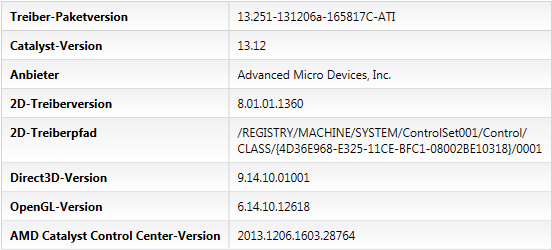AMD Catalyst 13.12 WHQL Desktop- und Notebook-Grafiktreiber

AMD hat den Cata┬Łlyst 13.12 WHQL ver┬Ł├Čf┬Łfent┬Łlicht, der erst┬Łmals die Frame-Pacing-Tech┬Łn┬Łlo┬Łgie beinhal┬Łtet. Aller┬Łdings gilt wei┬Łter┬Łhin die Ein┬Łschr├żn┬Łkung auf eine Auf┬Łl├Č┬Łsung von h├Čchs┬Łtens 2560├Ś1600 Pixel und einen ein┬Łzel┬Łnen Moni┬Łtor. Abhil┬Łfe soll hier vor┬Łaus┬Łsicht┬Łlich ein Beta-Trei┬Łber im Janu┬Łar schaf┬Łfen. Zudem bie┬Łtet das zer┬Łti┬Łfi┬Łzier┬Łte Trei┬Łber┬Łpa┬Łket Unter┬Łst├╝t┬Łzung f├╝r s├żmt┬Łli┬Łche Gra┬Łfik┬Łkar┬Łten-Seri┬Łen ab der Rade┬Łon HD 5000, was auch die aktu┬Łel┬Łlen Pro┬Łduk┬Łte der Rade┬Łon-Rx-2xx-Serie ŌĆ£Vol┬Łca┬Łnic IslandsŌĆØ beinhal┬Łtet. Laut den offi┬Łzi┬Łel┬Łlen Release Notes ist der Trei┬Łber zu allen Win┬Łdows-Betriebs┬Łsys┬Łte┬Łmen ab Vis┬Łta kompatibel.
In die Dezem┬Łber-Aus┬Łga┬Łbe des WHQL-Trei┬Łber┬Łpa┬Łke┬Łtes sind zudem erneut Opti┬Łmie┬Łrun┬Łgen zur Ver┬Łbes┬Łse┬Łrung der Sta┬Łbi┬Łli┬Łt├żt und Kom┬Łpa┬Łti┬Łbi┬Łli┬Łt├żt mit diver┬Łsen Anwen┬Łdun┬Łgen ein┬Łge┬Łflos┬Łsen. Eine voll┬Łst├żn┬Łdi┬Łge Lis┬Łte der vom Trei┬Łber unter┬Łst├╝tz┬Łten Hard┬Łware sowie s├żmt┬Łli┬Łcher beho┬Łbe┬Łner und bekann┬Łter Pro┬Łble┬Łme kann den offi┬Łzi┬Łel┬Łlen Release Notes ent┬Łnom┬Łmen wer┬Łden. Soll┬Łtet Ihr von Pro┬Łble┬Łmen betrof┬Łfen sein, die dar┬Łin nicht auf┬Łge┬Łf├╝hrt wer┬Łden, dann k├Čnnt Ihr das offi┬Łzi┬Łel┬Łle Cata┬Łlyst Crew Feed┬Łback Form ver┬Łwen┬Łden, um das Trei┬Łber-Team dar┬Łauf auf┬Łmerk┬Łsam zu machen. Eine Hil┬Łfe┬Łstel┬Łlung f├╝r das For┬Łmu┬Łlar k├Čnnt Ihr hier fin┬Łden.

AMD Cata┬Łlyst 13.12 WHQL ŌĆö Softwareinfo
Das hier zum Down┬Łload ange┬Łbo┬Łte┬Łne Trei┬Łber┬Łpa┬Łket AMD Cata┬Łlyst 13.12 WHQL ent┬Łh├żlt bereits eine aktua┬Łli┬Łsier┬Łte Lauf┬Łzeit┬Łum┬Łge┬Łbung des AMD Acce┬Łle┬Łra┬Łted Par┬Łal┬Łlel Pro┬Łces┬Łsing (APP) SDK 2.9, was AMDs L├Čsung zur Ent┬Łwick┬Łlung par┬Łal┬Łle┬Łli┬Łsier┬Łter Soft┬Łware auf Basis der Open┬ŁCL-Pro┬Łgram┬Łmier┬Łplatt┬Łform ist. Eine instal┬Łlier┬Łte Open┬ŁCL-Lauf┬Łzeit┬Łum┬Łge┬Łbung ist Grund┬Łvor┬Łaus┬Łset┬Łzung, wenn auf der Gra┬Łfik┬Łkar┬Łte oder APU Open┬ŁCL-Ker┬Łnel bzw. per Open┬ŁCL-beschleu┬Łnig┬Łte Pro┬Łgram┬Łme aus┬Łge┬Łf├╝hrt wer┬Łden sol┬Łlen. Mit dem Cata┬Łlyst 12.1 WHQL hat AMD die Wei┬Łter┬Łent┬Łwick┬Łlung von CAL und Open┬ŁCL unter Win┬Łdows XP ein┬Łge┬Łstellt. In den Trei┬Łber┬Łpa┬Łke┬Łten f├╝r Win┬Łdows XP sind daher seit dem Cata┬Łlyst 12.2 WHQL weder CAL noch die Open┬ŁCL-Lauf┬Łzeit┬Łum┬Łge┬Łbung enthalten.
Was ist neu?
Fea┬Łture High┬Łlights of AMD Cata┬Łlyst 13.12
- ŌĆŗSup┬Łport for the fol┬Łlo┬Łwing new products:
- AMD Rade┬Łon R9 290, 280, and 270 Series
- AMD Rade┬Łon R7 260, 250, and 240 Series
- ŌĆŗImpro┬Łved AMD Cross┬ŁFi┬ŁreŌäóŌĆŗ sca┬Łling for the fol┬Łlo┬Łwing game titles:
- Call of Duty: Ghosts (mul┬Łti┬Łplay┬Łer component)
- Splin┬Łter Cell Blacklist
- Saints Row 4
- Metro Last Light
- ŌĆŗNew AMD Endu┬Łro Tech┬Łno┬Łlo┬Łgy pro┬Łfiles for the fol┬Łlo┬Łwing game titles:
- ŌĆŗXCOM: Ene┬Łmy Unknown
- Need for Speed Rivals
- Total WarŌĆŗ: Rome 2
- Batt┬Łle┬Łfield 4
- Saints Row 4
- Splin┬Łter Cell Blacklist
- FIFA 14
- ŌĆŗSup┬Łport For AMD Cross┬ŁFi┬Łre frame pacing
- Frame pacing ensu┬Łres that frames ren┬Łde┬Łred across mul┬Łti┬Łple GPUs in an AMD Cross┬ŁFi┬Łre con┬Łfi┬Łgu┬Łra┬Łti┬Łon will be dis┬Łplay┬Łed at an even and regu┬Łlar pace
- Frame pacing is enab┬Łled through the AMD Cata┬Łlyst Con┬Łtrol Cen┬Łter, or on a per appli┬Łca┬Łti┬Łon basis
- Frame pacing is sup┬Łport┬Łed on DirectX 10 and DirectX 11 appli┬Łca┬Łti┬Łons using reso┬Łlu┬Łti┬Łons up to (and inclu┬Łding) 2560x1600 on a sin┬Łgle display
RESOLVED ISSUES:
This sec┬Łtion pro┬Łvi┬Łdes infor┬Łma┬Łti┬Łon on resol┬Łved known issues in this release of the AMDŌĆÖs Cata┬Łlyst Soft┬Łware Suite, AMD Cata┬Łlyst 13.12
- ŌĆŗŌĆŗŌĆŗMay resol┬Łve inter┬Łmit┬Łtent black screens or dis┬Łplay loss obser┬Łved on some AMD Rade┬Łon R9 290X and AMD Rade┬Łon R9 290 gra┬Łphics cards
- Resol┬Łves inter┬Łmit┬Łtent cra┬Łs┬Łhes seen in lega┬Łcy DirectX 9 applications
- AMD Rade┬Łon R9 290 Series ŌĆö Power Tune update to redu┬Łce vari┬Łance of fan speed / RPM
- PCIŌĆæE bus speed is no lon┬Łger set to x1 on the secon┬Łda┬Łry GPU when run┬Łning in an AMD Cross┬ŁFi┬Łre configuration
- Resol┬Łves incor┬Łrect HDMI Audio Dri┬Łver infor┬Łma┬Łti┬Łon being lis┬Łted in the AMD Cata┬Łlyst Con┬Łtrol Center
- Resol┬Łves AMD Ste┬Łady Video opti┬Łon being gray┬Łed out in the AMD Cata┬Łlyst Con┬Łtrol Center
- Resol┬Łves inter┬Łmit┬Łtent fli┬Łcke┬Łring seen on some AMD Rade┬Łon R9 270X gra┬Łphics cards
- Resol┬Łves gra┬Łphics cor┬Łrup┬Łti┬Łon issues found in Starcraft
- Resol┬Łves image cor┬Łrup┬Łti┬Łon seen in Auto┬Łdesk Inves┬Łtor 2014
- Resol┬Łves fli┬Łcke┬Łring water cor┬Łrup┬Łti┬Łon found in World of Warcraft
- Resol┬Łves inter┬Łmit┬Łtent black screen when resum┬Łing from a S3/S4 sleep-sta┬Łte if the dis┬Łplay is unplug┬Łged during the sleep-sta┬Łte on sys┬Łtems sup┬Łport┬Łing AMD Endu┬Łro Technology
- Resol┬Łves inter┬Łmit┬Łtent cra┬Łs┬Łhes expe┬Łri┬Łen┬Łced with Batt┬Łle┬Łfield 4 on Win┬Łdows 8 based systems
- Resol┬Łves the dis┬Łplay tur┬Łning green when using Win┬Łdows Media Play┬Łer to view HD .avi for┬Łmat video in an exten┬Łded desk┬Łtop configuration
- Resol┬Łves Metro appli┬Łca┬Łti┬Łons expe┬Łri┬Łen┬Łcing frame drops during play┬Łback of inter┬Łla┬Łced video content
- Resol┬Łves video play┬Łback cor┬Łrup┬Łti┬Łon of .wmv for┬Łmat files in Win┬Łdows Media Player
Download:
- AMD Cata┬Łlyst 13.12 WHQL [Win┬Łdows 8.1 / 8 / 7 64 bit] ŌĆö P3D
- AMD Chip┬Łset Dri┬Łvers 13.12 [Win┬Łdows 8.1 / 8 / 7 32 & 64 bit] ŌĆö P3D
- AMD RAID Dri┬Łver 13.12 [Win┬Łdows 8.1 / 8 / 7 32 & 64 bit] ŌĆö P3D
Wei┬Łte┬Łre Ver┬Łsio┬Łnen des Trei┬Łber┬Łpa┬Łkets k├Čn┬Łnen direkt bei AMD her┬Łun┬Łter┬Łge┬Łla┬Łden wer┬Łden: Dri┬Łvers + Down┬Łload Center
Der AMD Cata┬Łlyst Mobi┬Łli┬Łty f├╝r alle ATI Mobi┬Łli┬Łty Rade┬Łon HD 5000, AMD Rade┬Łon HD 6000M, HD 7000M sowie HD 8000M wur┬Łde eben┬Łfalls aktua┬Łli┬Łsiert und bie┬Łtet offi┬Łzi┬Łell auch Unter┬Łst├╝t┬Łzung f├╝r die Endu┬Łro-Tech┬Łno┬Łlo┬Łgie. Fol┬Łgen┬Łde Note┬Łbooks wer┬Łden aller┬Łdings offi┬Łzi┬Łell von dem Trei┬Łber┬Łpa┬Łket nicht unterst├╝tzt:
- Any note┬Łbook laun┬Łched after this dri┬Łver release.
- Toshi┬Łba note┬Łbooks (plea┬Łse check with your note┬Łbook OEM for dri┬Łver sup┬Łport for the┬Łse notebooks)
- Sony VAIO note┬Łbooks (plea┬Łse check with your note┬Łbook OEM for dri┬Łver sup┬Łport for the┬Łse notebooks)
- Pana┬Łso┬Łnic note┬Łbooks (plea┬Łse check with your note┬Łbook OEM for dri┬Łver sup┬Łport for the┬Łse notebooks)
Download:
AMD Cata┬Łlyst Mobi┬Łli┬Łty Komplettpakete:
- AMD Cata┬Łlyst Mobi┬Łli┬Łty 13.12 WHQL [Win┬Łdows 8.1 / 8 / 7 32 bit] ŌĆö P3D

- AMD Cata┬Łlyst Mobi┬Łli┬Łty 13.12 WHQL [Win┬Łdows 8.1 / 8 / 7 64 bit] ŌĆö P3D

Links zum Thema:
- Release Notes
- Gra┬Łphics Tech┬Łni┬Łcal Support
- Offi┬Łzi┬Łel┬Łles Support-Forum
- AMD Issue Report┬Łing Form
- AMD Issue Report┬Łing Form for Mobi┬Łli┬Łty Driver
- How to gather the optio┬Łnal infor┬Łma┬Łti┬Łon for the AMD issue report┬Łing form
- Gui┬Łde on how to install an ATI gra┬Łphics card and / or its drivers
- AMD Cata┬Łlyst 13.1 Lega┬Łcy WHQL f├╝r Rade┬Łon HD 2000, HD 3000 und HD 4000
- AMD Cata┬Łlyst 13.11 Beta 9.5 f├╝r Rade┬Łon HD 5000, HD 6000 und HD 7000
- Pha┬Łse 2 der Frame-Pacing-Tech┬Łno┬Łlo┬Łgie von AMD ver┬Łz├Č┬Łgert sich [Update]
- Sicher┬Łheits┬Łschwach┬Łstel┬Łle: AMD ent┬Łfernt auto┬Łma┬Łti┬Łsche Update-Benach┬Łrich┬Łti┬Łgung aus Catalyst-Treibern
- AMD been┬Łdet monat┬Łli┬Łchen Rhyth┬Łmus, um Qua┬Łli┬Łt├żt der Cata┬Łlyst-Trei┬Łber zu verbessern
- AMD f├╝hrt neu┬Łen Update-Rhyth┬Łmus f├╝r ├żlte┬Łre Gra┬Łfik┬Łkar┬Łten┬Łge┬Łne┬Łra┬Łtio┬Łnen ein
